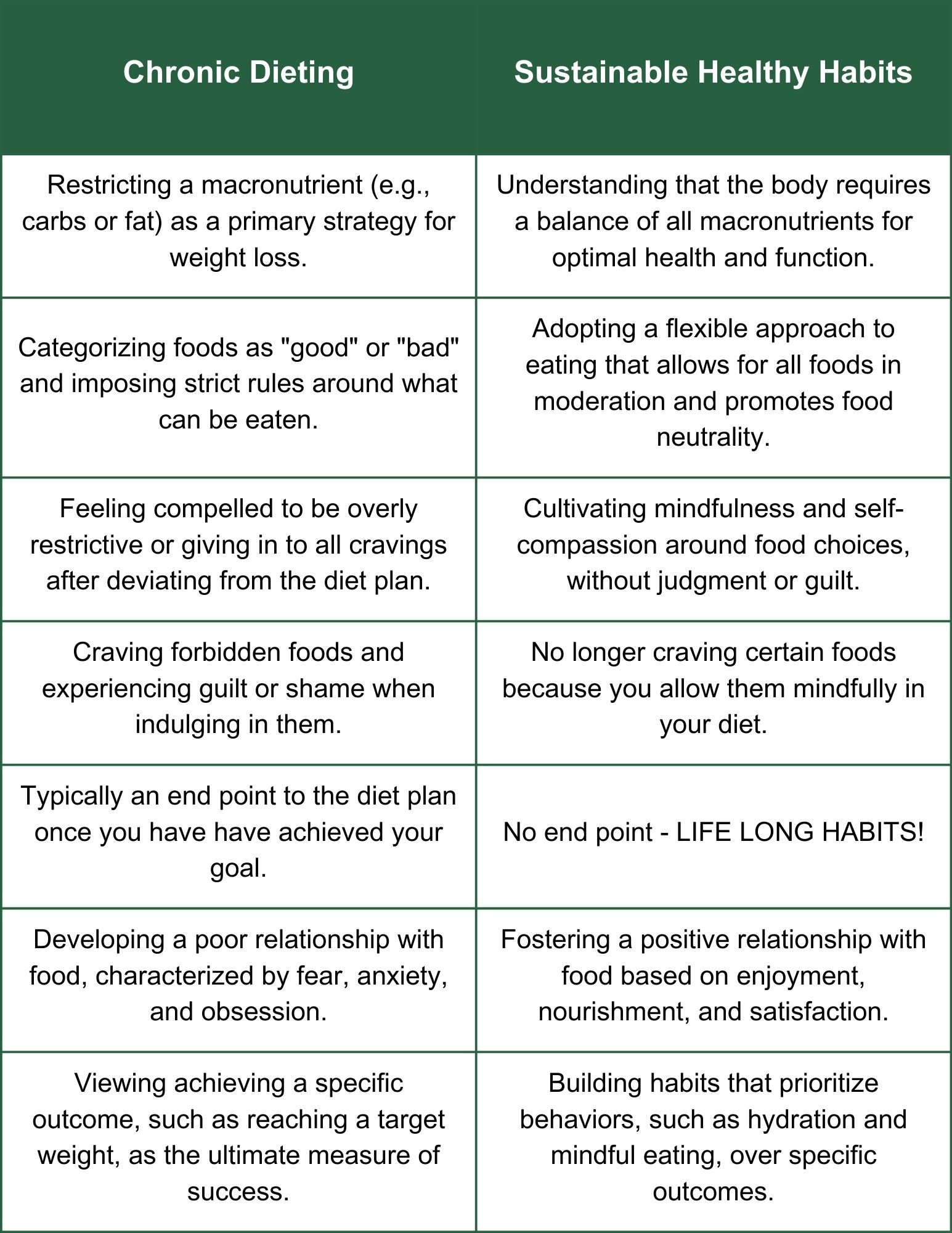Beyond Diet Culture: Unpacking the Long-Term Effects of Chronic Dieting
Americans spend over 30 billion dollars on diet products every year. It is a hugely profitable industry. And yet, to date, no diets have proven to provide long-lasting results. Most of those who diet intentionally to achieve weight loss regain the body weight or don’t lose significant amounts to begin with. In my nutrition practice, many clients come to me with a history of diet-hopping. And sure, some diets provided immediate “success”. But did they keep it off? No! Even worse, I often see clients with a history of trying the same diet over and over (e.g., Weight Watchers or Optavia) repeatedly with no sustainable results. Yet they hold on to the hope that the “next time will work for me.” Don’t you think these companies bank on having return customers? 100%.
At its core, chronic dieting involves constantly cycling through various diet plans or adhering to rigid food rules in pursuit of weight loss. Whether it's following popular diets like Keto or Paleo or imposing arbitrary restrictions on specific foods or food groups, chronic dieters often find themselves trapped in a cycle of restriction, deprivation, and eventual rebound.
To me, it is of utmost importance that people understand there are other ways to be healthy outside of restrictive diets. And ultimately, the methods I recommend are much healthier, as we know weight cycling (going up and down in weight) is bad for our health and can lead to a disordered relationship with food. In this post, I aim to illuminate the detriments of chronic dieting and uncover the alternatives to optimal, life-long health!
Distinguishing Chronic Dieting from Sustainable Healthy Habits
It's essential to recognize the differences between chronic dieting and sustainable healthy habits. While both may involve making dietary changes, their underlying motivations and long-term effects diverge significantly.
Warning Signs of Chronic Dieting
Recognizing the warning signs of chronic dieting can help individuals assess their relationship with food and identify when intervention may be necessary. Some common indicators include:
Having rigidity around food rules and becoming very stressed or anxious if you cannot follow said rules.
Rigidity around food rules and heightened stress or anxiety when unable to adhere to them.
Cycling between restriction and binge-eating behaviors in response to perceived dietary "failures."
Persistent engagement in new diets or repeated attempts at the same diet without sustained success.
Social withdrawal or avoidance of social situations involving food due to fear or discomfort.
Unhealthy preoccupation with weight, body image, and food intake, often accompanied by frequent weighing or calorie tracking.
Chronic dieting takes a toll on the body beyond just the numbers on the scale. While the short-term effects may seem manageable, the long-term consequences of restrictive eating habits can be significant and far-reaching. In this section, we'll explore how chronic dieting can lead to nutritional deficiencies, metabolic changes, and hormonal imbalances, undermining overall health and well-being.
Nutritional Deficiencies
One of the most significant risks associated with chronic dieting is the potential for nutrient deficiencies. By restricting food intake or eliminating entire food groups, chronic dieters may fail to meet their body's essential nutrient needs, leading to deficiencies in vitamins, minerals, and other vital nutrients. Common deficiencies associated with chronic dieting include:
Inadequate intake of micronutrients such as iron, calcium, vitamin D, and B vitamins.
Insufficient dietary fiber, leading to digestive issues and impaired gut health.
Low levels of essential fatty acids, which are crucial for brain function and hormone production.
Metabolic Changes
Chronic dieting can also have profound effects on metabolic function, disrupting the body's natural energy balance and regulatory mechanisms. When faced with prolonged periods of calorie restriction, the body responds by slowing down metabolism and conserving energy in an effort to preserve vital functions. This metabolic adaptation can lead to:
Reduced resting metabolic rate, making it harder to lose weight and maintain weight loss.
Increased propensity for weight regain following periods of dietary restriction.
Altered levels of hunger hormones, such as leptin and ghrelin, contributing to increased appetite and cravings.
Worsened metabolic markers such as insulin resistance and lipids
Hormonal Imbalances
Hormonal dysregulation is another common consequence of chronic dieting, impacting various systems throughout the body. The human body often relies on a delicate balance of hormones to regulate metabolism, mood, energy levels, and reproductive function. Chronic dieting, especially when aimed at weight loss, can disrupt this balance, leading to significant effects on body weight and overall health. This imbalance can manifest in several ways, affecting not just your weight loss efforts but also leading to broader systemic issues. Chronic dieting can disrupt this balance, leading to:
Impaired thyroid function, resulting in symptoms such as fatigue, weight gain, and metabolic slowdown.
Dysregulated cortisol levels, contributing to increased stress and inflammation
Disrupted menstrual cycles and reproductive health issues, including amenorrhea and infertility in women.
Mental Health Effects
Chronic dieting takes a significant toll on mental health, manifesting in various psychological challenges. In this section, we'll explore how chronic dieting contributes to such health problems: body dysmorphia, eating disorders, anxiety, and depression.
Body Dysmorphia
Chronic dieting often leads to body dysmorphia. This condition involves a distorted perception of one's body size, shape, or appearance, leading to obsessive thoughts and behaviors related to body image. Chronic dieters often fixate on perceived flaws or imperfections, regardless of their actual physical appearance. The relentless pursuit of an idealized body shape or size can lead to dissatisfaction, low self-esteem, and negative body image.
Eating Disorders
Chronic dieting can escalate into eating disorders. In fact, around 20-25% of diets result in ED’s, such as anorexia nervosa, bulimia nervosa, or binge eating disorder. Restrictive eating patterns and rigid food rules perpetuate cycles of guilt and shame, eroding self-worth.
Anxiety and Depression
The psychological toll of chronic dieting extends beyond body image concerns and eating behaviors, impacting overall mental well-being. Research has shown a strong correlation between chronic dieting and increased risks of anxiety and depression. The pressure to adhere to strict dietary rules and fear of weight gain contribute to increased anxiety and depression among chronic dieters. The constant cycle of success and failure in dieting exacerbates feelings of hopelessness and despair.
Chronic Dieting and Social Life
Chronic dieting doesn't just affect individuals internally; it also has profound implications for their social lives and relationships. The relentless focus on food and weight inherent in chronic dieting strains personal relationships, leads to social isolation, and disrupts social interactions. Fear of deviating from the diet plan and discomfort in social settings where food is present can cause chronic dieters to withdraw from social activities, creating tension and misunderstanding with friends, family members, and romantic partners. Recognizing the social implications of chronic dieting is essential for fostering understanding and support within personal networks and promoting holistic well-being.
Breaking the Cycle of Chronic Dieting
Breaking free from the cycle of chronic dieting requires a shift in mindset and behavior. Below are some strategies for recognizing harmful patterns, seeking support, and building a healthy relationship with food and body.
Recognizing Harmful Patterns
Identifying unhealthy dieting behaviors is the first step toward breaking the cycle of chronic dieting. Some tips for recognizing harmful patterns include:
Becoming aware of rigid food rules and restrictions that contribute to feelings of guilt and shame.
Monitoring thoughts and behaviors related to food, weight, and body image, and challenging negative self-talk.
Paying attention to physical and emotional cues, such as hunger and fullness signals, rather than relying on external rules or cues.
Seeking Support
Professional guidance from dietitians, therapists, and support groups can be invaluable in overcoming chronic dieting. Seeking support from qualified professionals can help individuals:
Explore underlying factors contributing to chronic dieting behaviors, such as past trauma, societal pressures, or low self-esteem.
Develop personalized strategies for establishing a balanced approach to eating and cultivating a positive body image.
Receive emotional support and encouragement from peers who understand the challenges of overcoming chronic dieting.
Building a Healthy Relationship with Food and Body
Fostering a healthy relationship with food and body is essential for long-term well-being. Some strategies for building a positive relationship include:
Practicing intuitive eating, which involves listening to the body's hunger and fullness cues and honoring its nutritional needs without judgment.
Cultivating self-compassion and acceptance by reframing negative thoughts and beliefs about food, weight, and body image.
Engaging in enjoyable physical activities that promote health and vitality, rather than focusing solely on exercise as a means of weight control.
Conclusion
It's crystal clear that the pursuit of weight loss through strict eating habits takes a toll, not just on our bodies but on our minds too. We've dug deep into how chronic dieting messes with our nutrition, metabolism, hormones, body image, and even our social lives. It's like being stuck in a loop of restriction, guilt, and feeling not good enough.
But here's the thing: there's a light at the end of this tunnel. By spotting the red flags, reaching out for help, and reshaping our relationship with food and our bodies, we can break free from the grip of chronic dieting. It's all about taking small steps, showing ourselves some love, and finding a balance that works for us.
So, take a moment to think about your own journey. If you've been caught in the dieting cycle, know that you're not alone, and there's a way out. Consider reaching out for support and exploring new paths towards food freedom and body acceptance.
If you are ready, My Food Freedom Program is here to guide you, offering a roadmap to escape the dieting trap and reclaim your mental space for a life filled with joy, balance, and vitality.
Together, let's ditch the dieting drama and embrace a life where we nourish ourselves inside and out with kindness, compassion, and true well-being.




